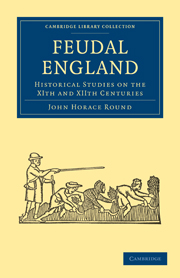Book contents
- Frontmatter
- Preface
- Contents
- PART I TERRITORIAL STUDIES
- PART II HISTORICAL STUDIES
- NORMANS UNDER EDWARD THE CONFESSOR
- MR. FREEMAN AND THE BATTLE OF HASTINGS
- MASTER WACE
- NOTE ON THE PSEUDO-INGULF
- REGENBALD, PRIEST AND CHANCELLOR
- THE CONQUEROR AT EXETER
- THE ALLEGED DESTRUCTION OF LEICESTER (1068)
- ELY AND HER DESPOILERS (1072–75)
- THE LORDS OF ARDRES
- EARLY IRISH TRADE WITH CHESTER AND ROUEN
- WALTER TIREL AND HIS WIFE
- WALDRIC, WARRIOR AND CHANCELLOR
- A CHARTER OF HENRY I. (1123)
- THE ORIGIN OF THE NEVILLES
- THE ALLEGED INVASION OF ENGLAND IN 1147
- THE ALLEGED DEBATE ON DANEGELD (1163)
- A GLIMPSE OF THE YOUNG KING'S COURT (1170)
- THE FIRST KNOWN FINE (1175)
- THE MONTMORENCY IMPOSTURE
- THE OXFORD DEBATE ON FOREIGN SERVICE (1197)
- RICHARD THE FIRSTS CHANGE OF SEAL (1198)
- COMMUNAL HOUSE DEMOLITION
- THE CINQUE PORT CHARTERS
- ADDENDA
- INDEX
THE OXFORD DEBATE ON FOREIGN SERVICE (1197)
Published online by Cambridge University Press: 05 October 2010
- Frontmatter
- Preface
- Contents
- PART I TERRITORIAL STUDIES
- PART II HISTORICAL STUDIES
- NORMANS UNDER EDWARD THE CONFESSOR
- MR. FREEMAN AND THE BATTLE OF HASTINGS
- MASTER WACE
- NOTE ON THE PSEUDO-INGULF
- REGENBALD, PRIEST AND CHANCELLOR
- THE CONQUEROR AT EXETER
- THE ALLEGED DESTRUCTION OF LEICESTER (1068)
- ELY AND HER DESPOILERS (1072–75)
- THE LORDS OF ARDRES
- EARLY IRISH TRADE WITH CHESTER AND ROUEN
- WALTER TIREL AND HIS WIFE
- WALDRIC, WARRIOR AND CHANCELLOR
- A CHARTER OF HENRY I. (1123)
- THE ORIGIN OF THE NEVILLES
- THE ALLEGED INVASION OF ENGLAND IN 1147
- THE ALLEGED DEBATE ON DANEGELD (1163)
- A GLIMPSE OF THE YOUNG KING'S COURT (1170)
- THE FIRST KNOWN FINE (1175)
- THE MONTMORENCY IMPOSTURE
- THE OXFORD DEBATE ON FOREIGN SERVICE (1197)
- RICHARD THE FIRSTS CHANGE OF SEAL (1198)
- COMMUNAL HOUSE DEMOLITION
- THE CINQUE PORT CHARTERS
- ADDENDA
- INDEX
Summary
GREAT importance is rightly assigned to the first instances of “a constitutional opposition to a royal demand for money,” of which the two alleged earliest cases are “the opposition of St. Thomas to the king's manipulation of the danegeld [1163], and the refusal by St. Hugh of Lincoln to furnish money for Richard's war in France [1197].” These two precedents are always classed together Dr. Stubbs writes of St. Hugh's action:–
The only formal resistance to the king in the national council proceeds from St. Hugh of Lincoln and Bishop Herbert of Salisbury, who refuse to consent to grant him an aid in knights and money for his foreign warfare … an act which stands out prominently by the side of St. Thomas's protest against Henry's proposal to appropriate the sheriff's share of danegeld.
And Mr. Freeman repeats the parallel:–
Thomas … withstands, and withstands successfully, the levying of a danegeld. … As Thomas of London had withstood the demands of the father, Hugh of Avalon withstood the demands of the son. In a great council … [he] spoke up for the laws and rights of Englishmen … no men or money were they bound to contribute for undertakings beyond the sea.
- Type
- Chapter
- Information
- Feudal EnglandHistorical Studies on the XIth and XIIth Centuries, pp. 528 - 538Publisher: Cambridge University PressPrint publication year: 2010First published in: 1895



